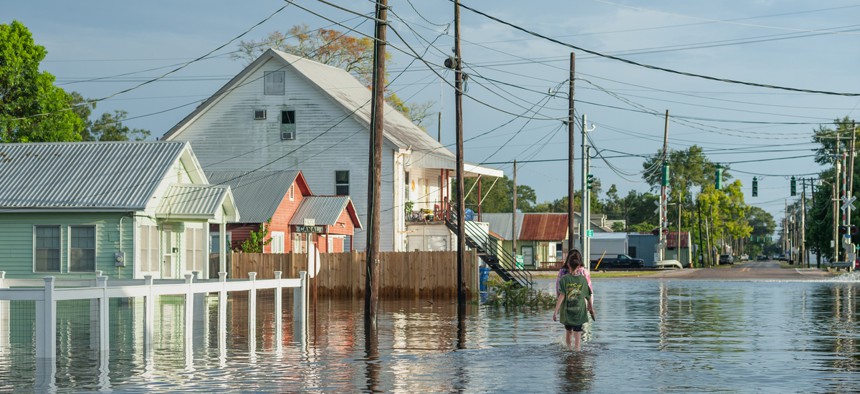Gulf Coast Advocates Call for a Halt in Immigration Enforcement in Wake of Hurricane Laura

Hurricane Laura left much of Louisiana flooded. Shutterstock
Advocates for undocumented immigrants say that migrants are less like to access evacuation help or emergency aid when they fear deportation.
Advocates for undocumented immigrants in southern states are calling on the U.S. Department of Homeland Security to halt immigration enforcement while people pick up their lives after Hurricane Laura. Threats of deportation make immigrants wary of accepting help from people in charge of evacuation efforts, providing emergency aid or setting up temporary shelters, they say.
In a letter sent on Wednesday to DHS Acting Secretary Chad Wolf by 40 advocacy organizations along the Gulf Coast, the groups say that “emergency protection from hurricanes and natural disasters is a fundamental human right; evacuation and displacement should never lead to deportation.”
“In the absence of assurances from DHS, immigrant residents and their families fear risking deportation when they engage with the state’s evacuation, shelter, and emergency aid efforts,” the letter reads. “Clear, specific assurances from DHS that immigration enforcement is unequivocally suspended is critical to the ongoing safety of all Gulf Coast residents during this humanitarian crisis.”
The effort to stop immigration enforcement, led by the New Orleans Workers' Center for Racial Justice, seeks to protect immigrant communities in Texas, Alabama, Arkansas, Louisiana, Mississippi, and Tennessee. Both Louisiana and Texas were pummeled by Hurricane Laura, and all of those states could see more storms in the coming weeks as hurricane season continues. Thousands of people were evacuated out of Laura’s path, which left behind destroyed houses and apartment buildings, especially in southwest Louisiana.
About 137,000 people have no water at all in Louisiana, while many more are being told to boil their water before use. About 75% of the power outages caused by Hurricane Laura have been restored, but 251,000 electricity customers, most of them in Louisiana, remained without power as of September 2.
The request to stop immigration enforcement while people assess the damage to their homes and figure out alternative living arrangements is not without precedent. During the recovery from some major natural disasters, including Hurricanes Isaac and Sandy in 2012, DHS issued statements to the public assuring that “there will be no immigration enforcement initiatives associated with evacuations and sheltering … including the use of checkpoints for immigration enforcement purposes.”
Immigrants held in Louisiana detention centers that contract with Immigration and Customs Enforcement say that Hurricane Laura knocked out power, flooded units, and caused “knee-deep” sewage backups. “The hurricane stopped up the water. No water, no electricity,” said one immigrant who posted a video to Facebook from inside the Jackson Parish detention center after Hurricane Laura. “Everybody’s going insane.”
Rather than bring more people into squalid conditions, the advocacy groups want to see DHS focus on “life-saving and life-sustaining activities, preventing the loss of property to the extent possible, and assisting with a speedy recovery of the affected region.” During past natural disasters, DHS has sometimes provided translators and assisted in recovery efforts coordinated by the Federal Emergency Management Agency or other state agencies.
Acting Secretary Wolf said during a press briefing on August 27 that DHS had deployed Customs and Border Protection air assets to assist in the recovery efforts from recent hurricanes. “Americans are resilient people, and DHS is prepared to help our fellow Americans in the path of the hurricane to recover and to respond,” he said.
But Wolf stopped short of assuring coastal immigrants that DHS would not conduct deportations during these recovery efforts.
DHS did not respond to a request for comment about whether they had reviewed the letter or if they might temporarily halt enforcement in the Gulf Coast.
Nikki Thanos, the legal and policy director for the New Orleans Workers’ Center for Racial Justice, said that focusing on immigration enforcement during a disaster is a waste of resources. “DHS is spending resources tearing families apart when all critical resources should be directed toward recovery—getting folks back in their homes and keeping families together,” she said.
Emma Coleman is the assistant editor for Route Fifty.
NEXT STORY: Will Labor Day Weekend Bring Another Holiday COVID Surge?






